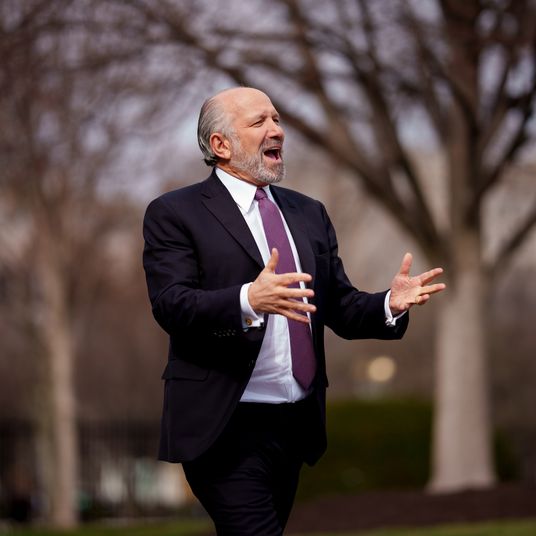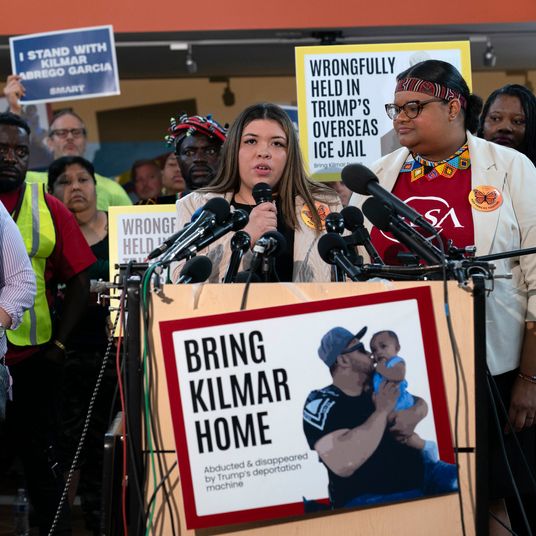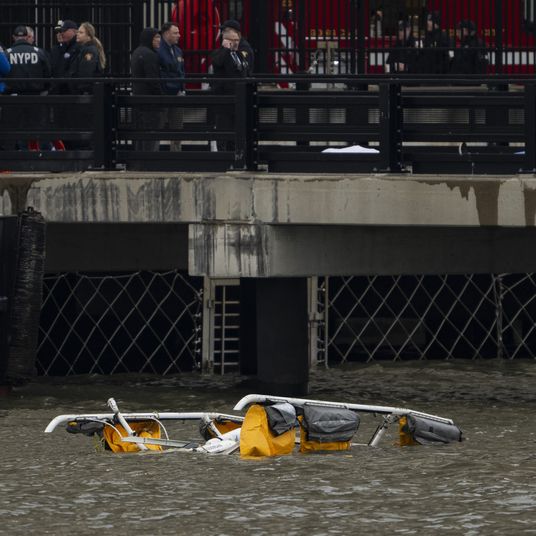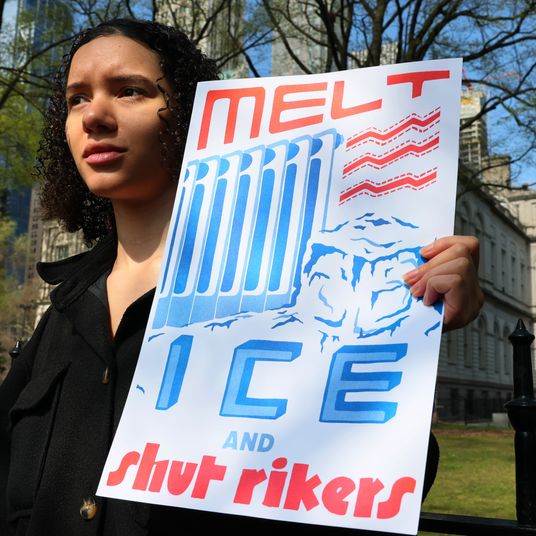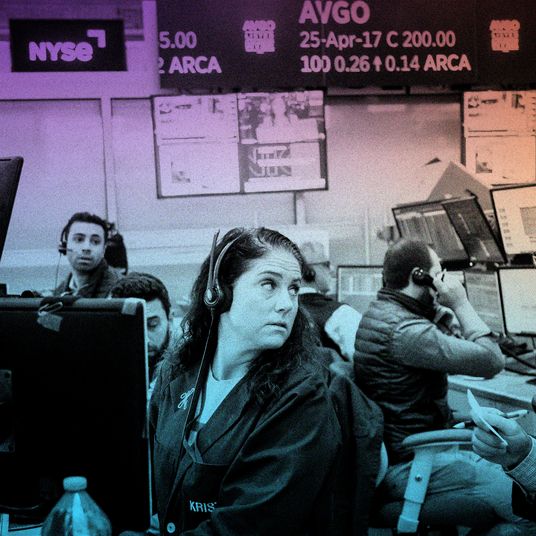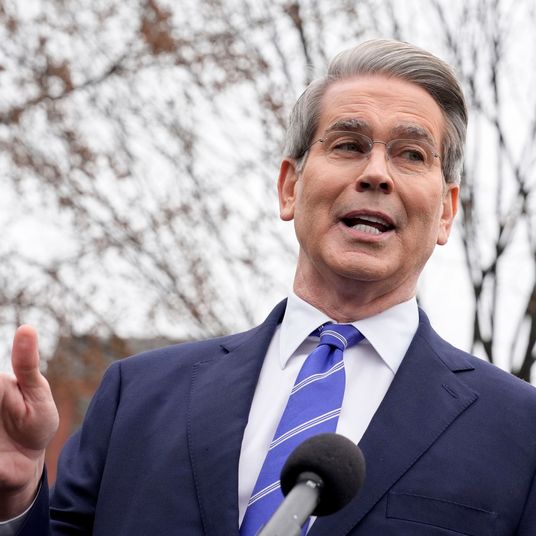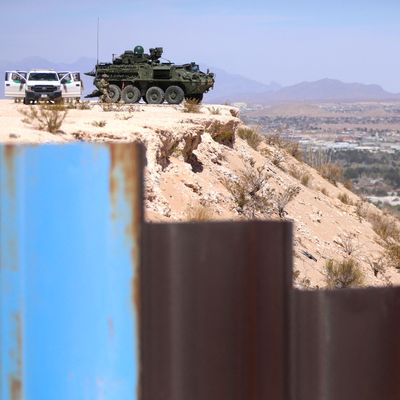
Donald Trump recaptured the White House by convincing voters to trust him on two issues: the economy and immigration. So far, the first is not going well. The month after his swearing in, the U.S. added 19,000 fewer jobs than expected and opinion polls showed his approval ratings underwater on the economy. On Wednesday, he announced new tariffs that sent global markets plummeting. A trade war and 1970s-style “stagflation” are now looming, which, besides ravaging Americans’ pocketbooks, could lead to him hemorrhaging political capital. That leaves immigration — which is also not going well. Per Axios, Trump’s rate of removals lags stubbornly behind Joe Biden’s in 2024, which Trump ridiculed as “weak and pathetic,” despite him promising “the largest deportation program of criminals in the history of America.”
Yet unlike Trump’s upending of the economy, which was always part of his plan, immigration enforcement seems to be a source of real frustration. The president was reportedly so angry that ICE had not met his arbitrary deportation quota by mid-February that he reassigned the agency’s two lead enforcers. In more recent weeks, with border crossings in decline and the economy set to contract, the administration has started coming up with increasingly creative ways to juice the boss’s stats, offering a glimpse of how wide America’s deportation dragnet can become when the president fixates on a solution in search of a problem.
The alleged problem — crime committed by immigrants — is being redefined accordingly. Students on visas and green-card holders who have spoken out in support of Palestine are suddenly criminals. And as he burns through the Mahmoud Khalils and Rumeysa Ozturks, Trump is turning his attention to seemingly any foreigner who has run afoul of the law — no matter how petty the indiscretion. Dogukan Gunaydin, a Turkish graduate student at the University of Minnesota, thought he had resolved his legal troubles when he pleaded guilty to a misdemeanor DUI in 2023. Then on March 27, he was snatched off the street by plainclothes ICE agents for the same offense. While it is unclear if deportation proceedings are underway as Gunaydin languishes in detention, legal analysts told the New York Times that a case as old and minor as his usually gets resolved with a written notification and a path to retaining visa status.
No more. Instead we see gestapo-like fear tactics, like when a woman identified as Sarahi, a Guatemalan undocumented immigrant with two children ages 1 and 5, accidentally drove onto the Ambassador Bridge, a one-way toll road connecting Michigan and Ontario, Canada, in March. The mistake got the vehicle’s passengers — including Sarahi’s kids and teenage brother — detained by border-patrol agents, who threatened to deport her. Rather than being released under supervision with a future court date, as formerly was custom, she was locked in a windowless office for five days with a single cup of ramen-noodle soup to split with her children that first night.
“This administration has an obsessive focus on detention,” Miriam Aukerman, an ACLU of Michigan staff attorney, told NPR of these methods, which oscillate between nitpicky quibbling and blithe carelessness. Kilmar Armando Abrego Garcia, a 29-year-old Salvadoran man living in Maryland with his American wife and 5-year-old son, was airlifted to CECOT, El Salvador’s megaprison, on March 16, after it appears he was baselessly labeled a member of MS-13. Lawyers for the administration admitted to making an “administrative error.” But Garcia, who has protected legal status and has lived in the U.S. since 2011, has now been exiled to what is functionally a legal black hole from which the administration claims it is powerless to retrieve him. Not that it wants to — when confronted about the error on X, Vice-President J.D. Vance falsely labeled Garcia “a convicted MS-13 gang member with no legal right to be here.”
And it’s not just ICE and border agents carrying out this agenda — the entire national-security apparatus seems to be following the same script. After the administration paid $6 million to have Garcia and more than 200 other deportees imprisoned in El Salvador and celebrated the transfer with a fascist sizzle reel, Kristi Noem, Trump’s secretary of Homeland Security, released footage of herself preening at CECOT wearing a $60,000 gold Rolex. Promotional videos of this variety — well-heeled politicos posing in front of kneeling prisoners — have been distributed so widely online that Garcia’s wife, who did not initially know where her husband had been taken, apparently discovered his location after spotting him in the background of one.
Trump’s deployment of 9,000 troops and tanklike armored trucks to the U.S.-Mexico border offers them a similar photo op. And while it is currently illegal for active-duty military to perform civilian law enforcement, the administration plans to recategorize a “buffer zone” along the border in New Mexico as a “satellite military installation” that would make crossing it equivalent to trespassing on a military base — this generating even more detainees to use as props.
These dire trends only stand to worsen as pressure mounts on Trump to fulfill his campaign promises — or at least give the appearance that he is. The administration already seems to have defied a judge’s order to halt the deportation flight that took Garcia to El Salvador, and if its defiance goes unchecked, there’s no telling how many more people could be vulnerable to removal. The president’s go-to move whenever he fears an election-season wipeout, dating back to his first term, is to demagogue immigration. But while the ginned-up migrant caravans of yesteryear have no obvious near-term equivalent, approaching headwinds portend more of the same: Tuesday’s state supreme-court election in Wisconsin broke heavily for the liberal candidate despite Elon Musk spending a record amount of money to defeat her.
Ultimately these developments speak to how contingent Trump’s political strengths are. The harder he leans on deportation theater in this imploding economy, the clearer it becomes that our crises cannot be purged by ICE agents, because they are homegrown.




